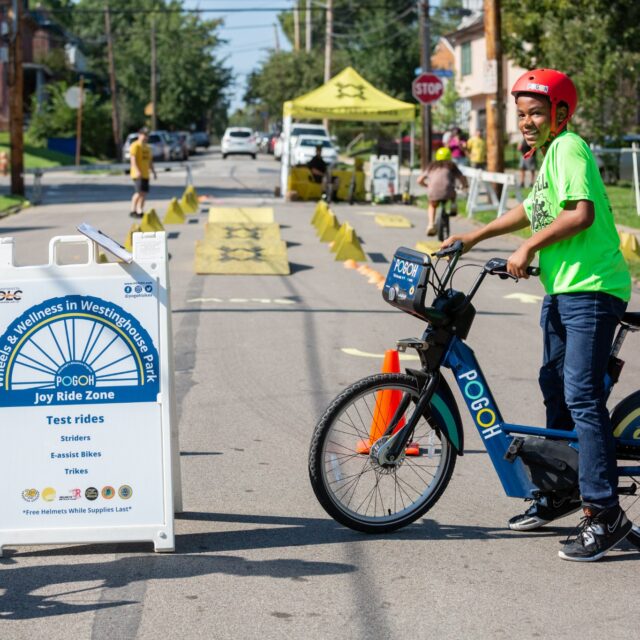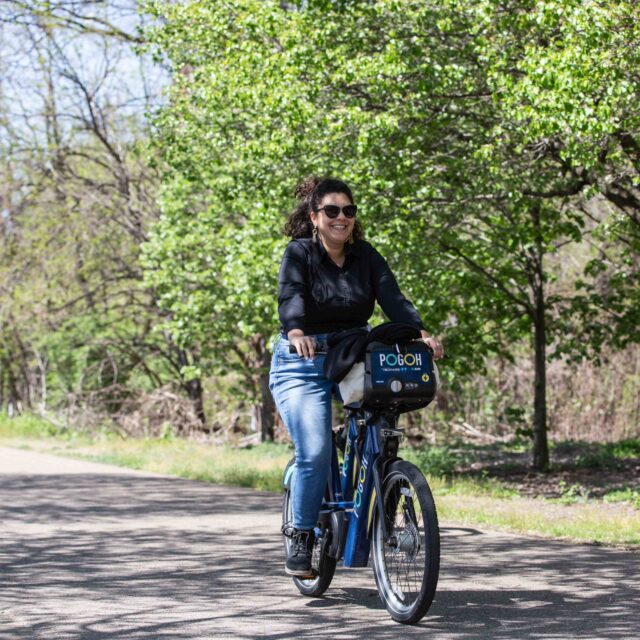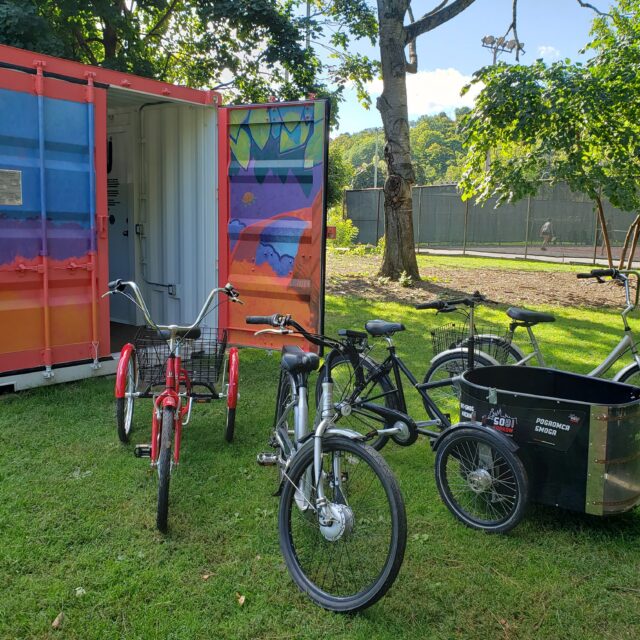Adaptive Bike Share Comes to Pittsburgh
by Kiran Herbert, Communications Manager
October 18, 2023
Thanks to a recent AARP grant, Bike Share Pittsburgh has secured an adaptive bike fleet and is currently building new programming around it.
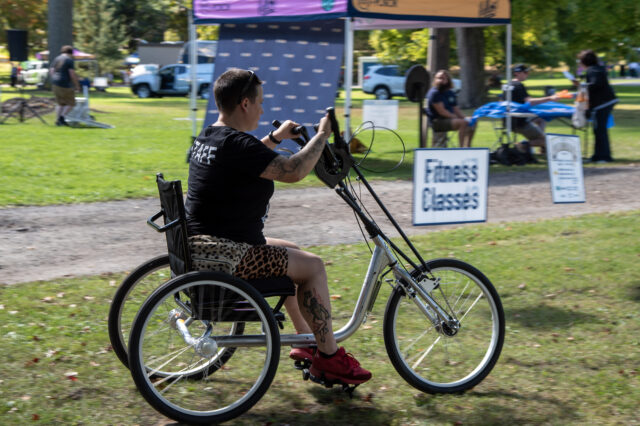
For years, the staff at Bike Share Pittsburgh — also known as POGOH, the name of the city’s system — has been considering adaptive bike share. In December 2021, Detroit’s MoGo Bike Share hosted a virtual Adaptive Bike Share Convening, bringing together folks from across the industry to learn about MoGo’s own program, which has been in operation since 2018, as well as other experts in the field.
“At the time, we didn’t really have a path forward — participating in the convening really moved adaptive bike share from a back burner issue to a front burner priority for us,” says Erin Potts, POGOH’s director of marketing and community outreach. “We knew that in order to make a system that really is inclusive and for everyone, we needed to start offering cycles that work for everyone.”
Potts was also cognizant of how adaptive cycles like trikes could also benefit Pittsbrugh’s senior residents, who often shared how the standard bike share bikes didn’t work with their balance issues. With this demographic in mind, POGOH applied to the American Association of Retired Persons (AARP) Community Challenge, which provides small grants to fund quick-action projects that can help communities become more livable for people of all ages.
“We’re in an aging city in Pittsburgh and a lot of those folks are finding bike share isn’t for them,” says Potts, noting that POGOH’s mission is to create the most joyful mobility service in the city. “We wanted to bring in adaptive cycles so that more people can use bike share for trips on the trail or to run an errand.”
The AARP grant was unique in that it allowed for funding to be used for equipment and POGOH jumped at the opportunity. Ultimately, the system was awarded a $14,000 grant, which funded a fleet of six adaptive bicycles: a recumbent bike, a tandem bike, a hand cycle, a cargo bike, an adult tricycle, and a side-by-side adult tricycle. The grant also funded an old shipping container to house them in — an idea inspired by another adaptive bike share program in Hamilton, Ontario. Like the hub in Hamilton, POGOH plans on eventually contracting a local artist to paint a mural on all sides of the shipping container, helping to beautify the container and allow passersby to immediately understand its function.
Prior to securing the fleet, POGOH initially thought that it would place the adaptive storage container in a spot right on the Great Alleghany Passage, where there are riverfront views, wonderful bike infrastructure, a large free parking lot, and easy access to a traditional bike share station (for friends and family who want to accompany adaptive riders). What POGOH didn’t anticipate was how drawn out the bureaucratic process of station siting would be.
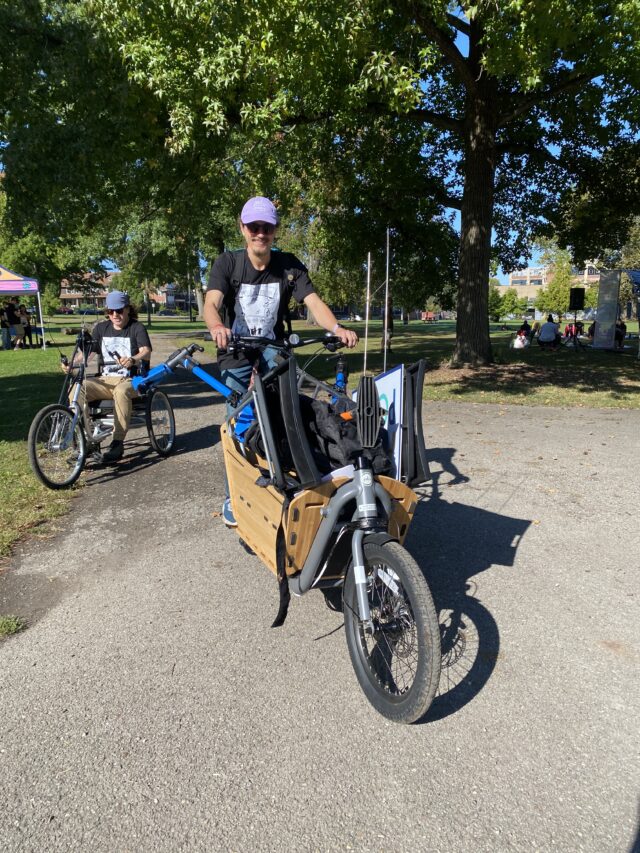 “We’re finding that we have to work through not just one organization but multiple organizations to get an agreement in place to allow us to operate there,” says Potts. “We have a lot of great partners in this process, so these conversations are welcome, but they’re just taking longer than we anticipated.”
“We’re finding that we have to work through not just one organization but multiple organizations to get an agreement in place to allow us to operate there,” says Potts. “We have a lot of great partners in this process, so these conversations are welcome, but they’re just taking longer than we anticipated.”
In order to get the bikes out into the community sooner, POGOH decided to host two pop-up events, the first of which was at the End of Summer Roll Up on September 30. Designed to build a more diverse and inclusive bicycling community in Pittsburgh, POGOH felt that the Summer Roll Up was the perfect place to debut its new fleet and reach new demographics of riders. The goal of the pop-up was to let folks try out the bikes and solicit feedback from the community at large. In a helpful twist, multiple people from accessible organizations also showed up to connect with POGOH and get on their radar.
“We knew that we wouldn’t come right out of the gate knowing everything,” says Potts. “The program really needs to be based on feedback from Pittsburghers who are going to use these cycles so we can build the best adaptive bike program for our town.”
Some of the comments POGOH received at that event included thoughts on the location (the park wasn’t all that accessible, and there were lots of potholes on the trails themselves), a desire for more trikes (two of the fleet’s three trikes were on backorder and unavailable for the launch), and excitement about the hand tricycle, which proved to be a big hit. While the initial grant was focused on seniors, many of the bikes are useful for folks with all different kinds of abilities that prevent them from riding a two-wheeled bicycle. One woman, who had ridden bikes her whole life, had recently become blind — she came out to the pop-up and tried out the tandem bike with her husband, offering honest feedback on what she would need from an adaptive program to feel supported.
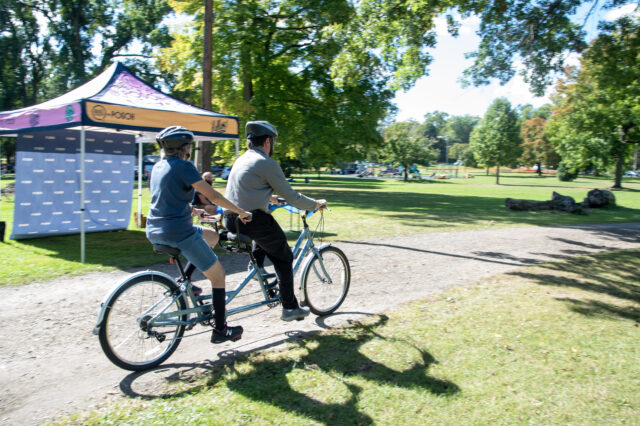
Adaptive POGOH’s second pop-up event will take place on Friday, October 20 from noon to 6 pm at the Color Park along the city’s Southside Riverfront Trail. Like the first event, the pop-up is completely free and open to the public, who are invited to test out the new adaptive fleet on a first come, first served basis and let the team know what they’d like to see in a long-term program.
There are still plenty of details to be worked out, including what sort of operating model POGOH will go with (maintaining walk-up hours or a reservation system are the biggest questions). No matter what, the system knows that it will eventually partner with one or several other organizations already working in the adaptive space. What pricing will look like is also up in the air.
“For right now we’re keeping things free and we’d love to keep it free long-term but that’s dependent on additional funding,” says Potts, noting that they’ll likely end up going with an affordable rental fee. As for securing additional funding, that’s also to be determined. “I’m not too nervous about finding funding — there’s a huge appetite for this kind of programming locally. This is something the community really wants and really needs.”
The Better Bike Share Partnership is funded by The JPB Foundation as a collaboration between the City of Philadelphia, the National Association of City Transportation Officials (NACTO), and the PeopleForBikes Foundation to build equitable and replicable bike share systems. Follow us on LinkedIn, Facebook, Twitter, and Instagram, or sign up for our weekly newsletter. Have a question or a story idea? Email kiran@peopleforbikes.org.

